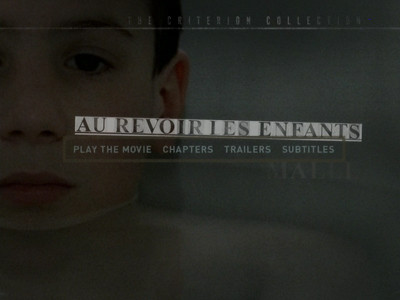
The effectiveness of Louis Malle's 1987 pseudo-memoir Au revoir les enfants is that despite being set in occupied France in WWII, it isn't really a movie about the war. Based partially on the writer/director's own experience, the film successfully recreates the mindset of childhood. Even though signs of the political and social turmoil of the war are all around the young boys attending an out-of-the-way Catholic boarding school, their lives carry on almost as normal. Thus, when the outside world does finally intrude, it strikes even harder.
Julien Quentin, played by Gaspard Manesse with a wide-eyed curiosity that is reminiscent of a very young Jean-Pierre Leaud in the way he drinks everything in, is a well-to-do Catholic boy at the head of his class. A bit of a mama's boy, he's also got a touch of the class clown and tends to be the kid that understands the various angles of how things work. When a new student, Bonnet (Raphaël Fejtö), joins the class after summer vacation, he immediately rubs Quentin the wrong way. Bonnet is aloof and maybe a little stuck up, and he's also fairly smart and could be competition for Quentin.
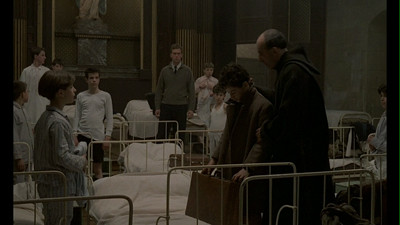
When the head of the school, Father Jean (Philippe Morier-Genoud), asks Quentin to cut Bonnet a break and encourage the other boys to be friendly toward him, Quentin suspects something is amiss. He asks the priest if the new kid is sick, and Father Jean says he isn't. What, then, makes Bonnet different and deserving of special treatment? Quentin does as he was asked, using it as an excuse to ask the other boy questions. He also begins watching, observing Bonnet's behavior, and searches his locker for clues.
A secret prayer, a name in a book, a refused piece of meat--it doesn't take long for Quentin to figure out that Bonnet is a Jew. Yet, the boy doesn't really understand why Bonnet would be at the Catholic school, and that's because he doesn't really know what it means to be Jewish. He asks his older brother Francois (Stanislas Carre de Malberg), and he tells him that being a Jew means you don't eat pork. For Quentin, that seems like a n odd reason to hate anyone. His brother then says that it's more because the Jews killed Jesus, to which the younger boy replies that it wasn't the Jews, it was the Romans who crucified Jesus. The simplicity of the logic is shocking in its own way, maybe even more than when other boys curse the Jews, clearly parroting things they have heard from adults without realizing the full meaning of the words. Quentin's capacity for rejecting the rhetoric when it doesn't jibe with what he knows is an all too rare trait.
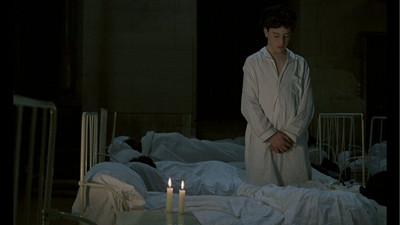
Louis Malle keeps the intrusion of adult explanations to a minimum in Au revoir les enfants, thus avoiding being preachy or explaining to his audience what we already know. This means that there isn't an instant friendship between Quentin and Bonnet, an immediate bridging of the gap so that the Gentile child is painted as noble and caring. Even so, Au revoir les enfants is more about friendship than anything. The film traces the contentious relationship of the two, showing Bonnet's defensiveness and Quentin's frustration. As children tend to do, they fall out, make-up, and then fall out all over again. After being lost in the woods during a game that appears to be a variation on "Capture the Flag," the boys bond through their mutual fear of what lies in the dark, and then are together when Nazis on patrol pick them up. Rather than bringing them closer, Bonnet rejects Quentin, probably because he's embarrassed by having shown his fear so openly and worried that he is more vulnerable. Only after an angry wrestling match do the boys get the tension out and see the error of their ways, becoming the friends they were always meant to be. The roughhousing boggles Quentin's mom (Francine Racette), but it's part of the natural cycle amongst school chums. Had they had more time, I am sure there would be plenty more breaking up and making up.
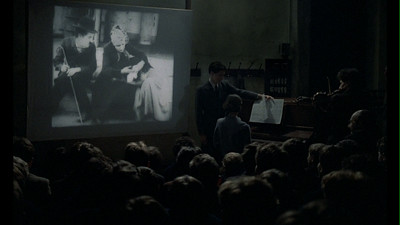
Both of the young actors are really good, though as I've already suggested, Gaspard Manesse really stands out as Quentin. You can always see the wheels turning behind his eyes, see him processing whatever new data he is taking in. Raphaël Fejtö gives an appropriately understated performance. In contrast to his counterpart, Fejtö must remain guarded. Instead of taking everything in, he is holding it all at arm's length. Both boys really prove their acting chops when they aren't speaking, in the silences that pass between them. You know that theirs is a friendship that will endure when you see them laughing together while watching a Chaplin film, the shared joy being the ultimate glue. Malle is like so many filmmakers before and since who have used the movie-going experience as social lubricant for connecting his characters, just as he likely hopes a movie like Au revoir les enfants will bring his audience closer. The scene actually reminded me of the convicts watching a Disney cartoon together in Preston Sturges' Sullivan's Travels. Something about being in the dark together, having a good time, tightens those ties that bind. Compare it to the earlier scene in the underground air raid shelter when Quentin wouldn't share his flashlight with Bonnet. It's as if light was something to be horded when one is forced into hiding, but to be shared if it is coming out of a movie projector. In a way, watching Chaplin is a defiant act, flaunting their freedom, ignoring the chaos beyond the school walls.
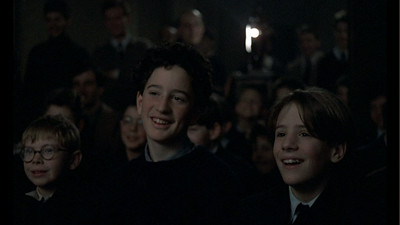
Of course, the war will eventually catch up with these boys. The title Au revoir les enfants has a literal narrative significance, even appearing as dialogue, but its larger meaning refers to saying good-bye to one's innocence. In keeping with the restraint he has shown throughout the picture, however, Malle doesn't go overboard. There is betrayal, but it's personal and mostly felt, not seen. There is also danger, but no guns are fired, no punches are thrown. He doesn't suddenly pick up his camera, which has stayed firmly on the ground up until that point, and start giving us sweeping crane shots and manic zooms. Nor does Malle give any of his characters a grandstanding speech, and when Father Jean ends up in trouble, his students express their appreciation, but there isn't a mawkish Dead Poets Society
And again, it's the unsaid that hits the hardest. Through the whole movie, there is an importance placed on silence (even the Chaplin movie is silent). Bonnet has a secret, and when Quentin asks too many questions, he is in danger of wrecking it; in that vein, when the boys witness an older Jewish man being persecuted in a restaurant, he responds with a stoic dignity whereas the collaborator police are overly demonstrative buffoons. When Bonnet is discovered in the climax, it's because of an accidental look from Quentin, and when they must say good-bye, a glance and a wave speak volumes. The final shots are just on Quentin, watching the space where he last saw his friend, tears in his eyes. When the voice of an older man, of Quentin all grown up, came on to tell us what happened after, it floored me. Now that someone actually was speaking the unspeakable, tears welled up in my own eyes. In the preceding 100 minutes, I had formed my own friendship with the boys, another silent relationship, and now that connection was being severed, too. It's a tragic moment beautifully expressed.
It also confirms that movies do, in fact, connect us, and not just in shared laughter, but shared tears, as well. Cinema makes all experience accessible. It puts each member of the audience right in the thick of it. In that way, it connects the ages, to show us what happened so that we never forget, and by making us feel, reminds us that we, too, are human.
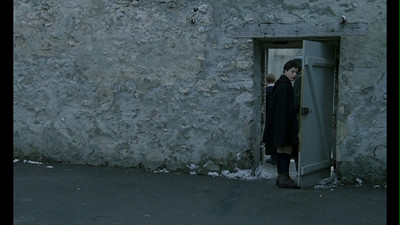

No comments:
Post a Comment